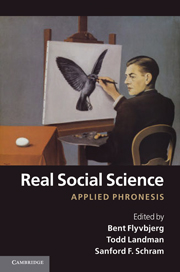Book contents
- Frontmatter
- Contents
- Figures
- Tables
- Contributors
- Acknowledgements
- 1 Introduction: new directions in social science
- Part I Theory and method
- 2 Phronetic social science: an idea whose time has come
- 3 Phronesis and narrative analysis
- 4 The feel for power games: everyday phronesis and social theory
- 5 Phronesis, projects and power research
- Part II Applied phronesis
- 6 Why mass media matter and how to work with them: phronesis and megaprojects
- 7 Power and conflict in collaborative research
- 8 Unsettling a settler society: film, phronesis and collaborative planning in small-town Canada
- 9 Phronesis and critical policy analysis: Heathrow's ‘third runway’ and the politics of sustainable aviation in the United Kingdom
- 10 Amnesty in the age of accountability: Brazil in comparative context
- 11 Feminist phronesis and technologies of citizenship
- 12 Making the teaching of social justice matter
- 13 Spatial phronesis: a case study in geosurveillance
- 14 Important next steps in phronetic social science
- Index
- References
14 - Important next steps in phronetic social science
Published online by Cambridge University Press: 05 June 2012
- Frontmatter
- Contents
- Figures
- Tables
- Contributors
- Acknowledgements
- 1 Introduction: new directions in social science
- Part I Theory and method
- 2 Phronetic social science: an idea whose time has come
- 3 Phronesis and narrative analysis
- 4 The feel for power games: everyday phronesis and social theory
- 5 Phronesis, projects and power research
- Part II Applied phronesis
- 6 Why mass media matter and how to work with them: phronesis and megaprojects
- 7 Power and conflict in collaborative research
- 8 Unsettling a settler society: film, phronesis and collaborative planning in small-town Canada
- 9 Phronesis and critical policy analysis: Heathrow's ‘third runway’ and the politics of sustainable aviation in the United Kingdom
- 10 Amnesty in the age of accountability: Brazil in comparative context
- 11 Feminist phronesis and technologies of citizenship
- 12 Making the teaching of social justice matter
- 13 Spatial phronesis: a case study in geosurveillance
- 14 Important next steps in phronetic social science
- Index
- References
Summary
Applied phronesis
The term ‘phronetic social science’ was coined in Making Social Science Matter (Flyvbjerg 2001). However, as pointed out in that volume and by Schram (2006), phronetic social science existed well before this particular articulation of the concept, but it was just not organized, recognized or named as such. Rather, it occurred here and there as scholars had adopted phronesis-like methods for their own purposes. The present title is the first organized volume of empirical–practical work in phronetic social science. Before Making Social Science Matter, phronesis, as a critical term of Aristotelian philosophy, had been theorized and its continuing importance as a key concept in Western thought had been convincingly argued by distinguished philosophers like Hans Georg Gadamer, Hannah Arendt, Alasdair MacIntyre and Richard J. Bernstein, among others. But no one had developed the theory and philosophy of phronesis into a practical methodology that could be applied by researchers interested in actually practising a phronetic social science. Making Social Science Matter developed such a methodology. Its implications were discussed and developed further in Making Political Science Matter (Schram and Caterino 2006). After these two theoretical–methodological contributions, it was evident that an important next step in demonstrating the usefulness of phronetic social science would be to illustrate, with concrete examples, how applied phronesis works in practical, empirical social science research. The contributions on applied phronesis contained in the present volume make clear that this next step has now been taken.
Information
- Type
- Chapter
- Information
- Real Social ScienceApplied Phronesis, pp. 285 - 297Publisher: Cambridge University PressPrint publication year: 2012
References
Accessibility standard: Unknown
- 12
- Cited by
